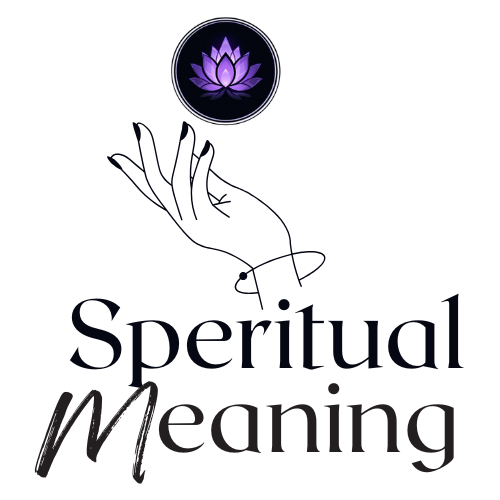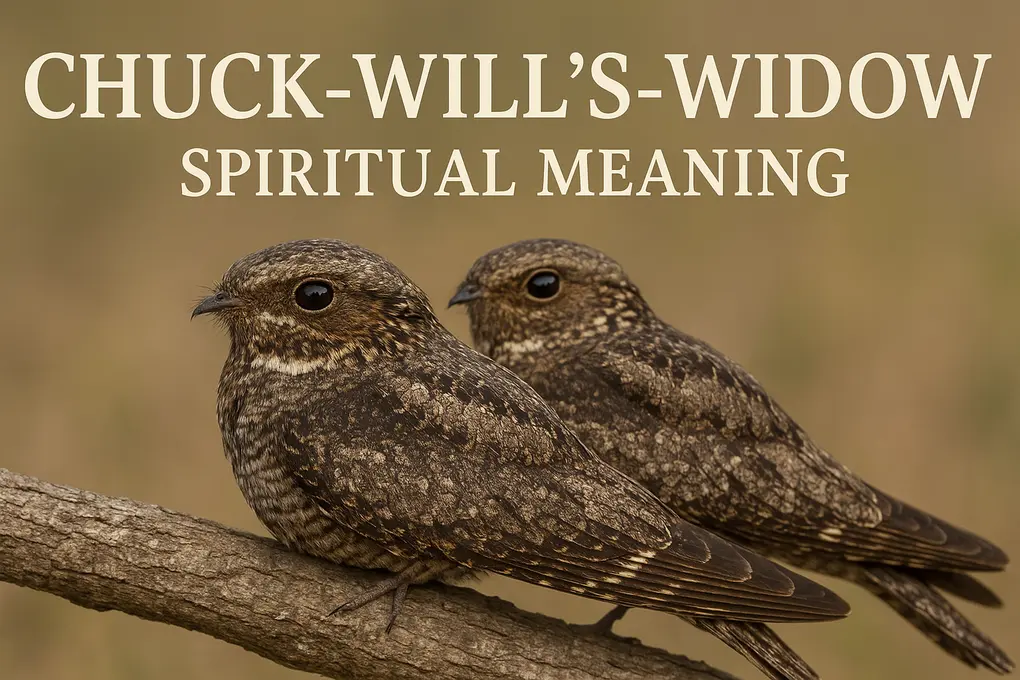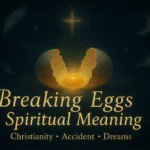On a warm summer night, I sat quietly on my porch under a star-studded sky. Suddenly a soft,haunting whistle floated on the breeze, the unmistakable call of the Chuck-will’s-widow. Intrigued, I felt a shiver of wonder. What messages might this mysterious night bird carry? That evening I embarked on a spiritual journey, exploring old legends and modern insights about the Chuck-will’s-widow’s meaning. The experience felt almost mystical, as if the universe itself was speaking through that ethereal call.
What is in The Name?
The Chuck-will’s-widow (pronounced chuck WILLZ wid-ow) is not a person at all but a large nocturnal bird of the nightjar family. Native to the southeastern United States, it ranges from Texas and Florida northward into the mid-Atlantic.
The name “Chuck-will’s-widow” is actually onomatopoei, imitating the bird’s own call. When heard up close, the whistle can sound like the phrase “Chuck-will’s-widow.” Folk etymology spun fanciful stories about a man named Chuck Will and his widow, but in truth the name simply echoes the bird’s voice. Often abbreviated to “Chuck” by birders, this nightjar is also historically nicknamed a “goatsucker.” (Ancient lore claimed nightjars suckled goats, hence the Latin name Caprimulgus, meaning “goat milker”) The old myth adds to the mystique, but really the Chuck-will’s-widow is just a secretive insect-eater, swooping silently at night to feed on moths and beetles.
Cultural, Mythical & Biblical Associations:
Across the world, cultures have woven stories around this elusive bird. In many Native American traditions, nightjars like the Chuck-will’s-widow are seen as messengers between this world and the spirit realm. Hearing its call could mean an ancestor is nearby or that the cycle of life and death is being honored.
In Mexican/Aztec lore, this bird was linked to gods of death and rebirth, acting as a guide for souls. It symbolizes that transition from the mortal world to the afterlife, in other words, hope and comfort in loss. Some Southeast Asian and African traditions similarly see nocturnal birds as bringers of transformation and renewal. In Indian folklore, it was even considered good luck to have this bird around in times of need.
Looking through a Biblical lens, the Chuck-will’s-widow itself isn’t mentioned by name. However, nightjars do appear in scripture. Isaiah 34:14, for example, refers to a “nightjar” (Hebrew lilit, often translated “screech owl” or “Lilith”) among creatures inhabiting ruins. This passage is a prophecy of desolation, and the nightjar there represents eerie silence and abandonment. Some say this ancient association gave nightjars a spooky reputation as omens.
Yet modern interpretations are kinder: the Chuck-will’s-widow’s presence under the stars can be seen not as a curse but as an invitation to confront darkness with courage. In other words, even if a Bible verse once cast the nightjar in a shadow, today’s spiritual seekers often reclaim its image focusing on renewal and divine guidance rather than doom.
At a minimum, considering the bird in a spiritual context reminds us how humans have long looked to the natural world, even an odd “goatsucker” of a bird, to find meaning in life’s mysteries.
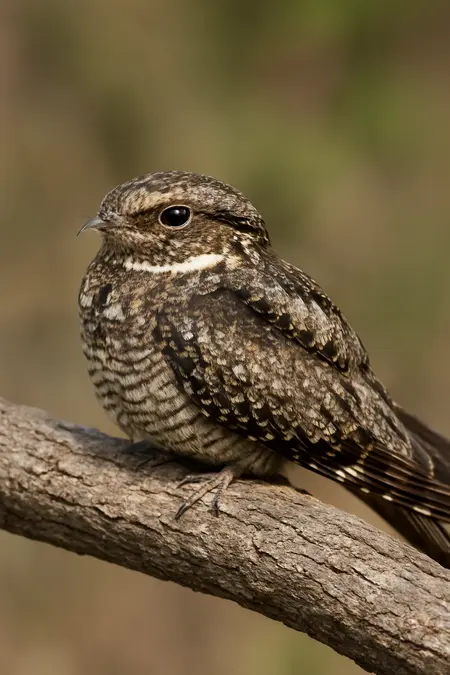
Spiritual Meanings of the Call:
Hearing the Chuck-will’s-widow’s call is often interpreted as a meaningful message from the universe. In spiritual and metaphysical communities, birdsong, especially at night, is seldom “just a coincidence.” Here are some common interpretations:
- Transformation & Change: Many believe the night-bird call signals that big changes are coming. Just as birds transition between night and day, the Chuck-will’s-widow may herald the end of one phase and the start of another. It’s like a cosmic hint: the old era is fading, and something new is taking flight. Embrace upcoming shifts (and trust that you have the strength to adapt).
- Release and Freedom: Similarly, spiritual guides often suggest its song means “break free” from what’s holding you back. If you’ve felt weighed down, hearing this call could be interpreted as a nudge to drop dead weight, negative thoughts, toxic ties, or old regrets, and spread your wings toward greater freedom.
- Divine Protection: Birds, in general, are seen as messengers or guardians. Listening to a nocturnal call can be reassuring, a reminder that guardian angels or spirit guides watch over you. In dark moments, that distant song may symbolize divine protection. You’re not truly alone in the night; unseen allies stand with you.
- Intuition and Inner Guidance: As mentioned, the Chuck-will’s-widow emphasizes trusting your inner voice. Its call might be urging you to listen inward, pay attention to dreams or gut feelings. Perhaps there’s a decision you’ve been hesitating on; this is a gentle push to trust yourself and take intuitive action.
- Hope and Renewal: Just before dawn, birds often sing as a herald of light. A Chuck-will’s-widow singing in the wee hours can symbolize hope after darkness. It suggests that no matter how long the night, dawn is on its way. The next sunrise could bring fresh beginnings.
- Messages from Beyond: In some cultures, night-birds are thought to carry messages from ancestors or departed loved ones. For example, some Native American traditions hold that hearing the Chuck-will’s-widow at night may mean a loved one in spirit is visiting or sending comfort. Even if you’re not expecting it, remain open to subtle signs. A familiar memory or warm feeling might surface as you hear the call.
In practical terms, timing can color the meaning. For instance, hearing the Chuck-will’s-widow around midnight, the so-called “witching hour”, is often taken as a sign of spiritual awakening or a shift in consciousness.
Timing of Nightly Calls:
| Time of Night | Possible Message |
|---|---|
| Midnight | Spiritual awakening or transformation is underway. |
| 1–3 AM | Focus on your life’s purpose and inner guidance. |
| 3–5 AM | Face deep fears and challenges; growth comes from overcoming them. |
| Just Before Dawn | Hope and renewal are on the way; light after darkness. |
Whether or not you buy into every symbolic meaning, many people find that paying attention to these signs helps them tune into their life’s currents. The Chuck-will’s-widow’s call simply prompts us to listen more closely, to nature, to our instincts, and to the subtle guidance all around.
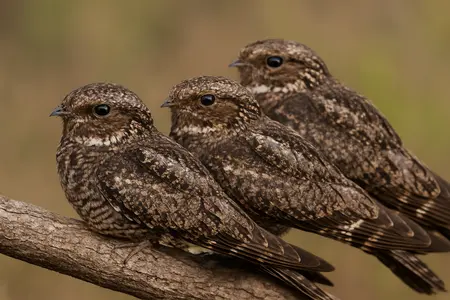
Love, Romance, and the Chuck-will’s-Widow:
In matters of the heart, this night bird also carries a sweet romance. Across cultures, nighttime bird songs are sometimes seen as omens of love. For the dreamy romantics, the Chuck-will’s-widow’s hooting in the moonlight can be a hopeful sign: it whispers that love might be near. Spiritual writers even say a solitary bird call after dark could mean your soulmate is coming into view.
The Cape May romance anecdote hints at this too. Imagine you’re hand-in-hand on a quiet beach path, and the Chuck-will’s-widow calls. Its soft lilt could become the music to your night of budding love, “a night to remember,” as one naturalist puts it. Conversely, if you’re already partnered, hearing its song can remind you to cherish your bond and appreciate the beauty of shared quiet moments.
On an emotional level, the bird’s symbolic focus on balance and introspection also translates into relationships. Its message might be to balance your own needs with the partnership, to reflect on communication, or to seek deeper understanding between lovers. The warm reddish tones of the bird might even inspire the root chakra (grounding) and heart chakra (love) energies, grounding you in self-love and opening you to give and receive affection.
Symbolism and Spiritual Traits:
The Chuck-will’s-widow carries a wealth of symbolic meaning. As a nocturnal messenger, it teaches us to find guidance even in darkness. Below are some of the key symbolic traits associated with this mysterious bird:
| Symbol | Spiritual Meaning |
|---|---|
| Protection | The Chuck-will’s-widow is often seen as a guardian. Its vigilant nighttime watch suggests safety, encountering it can feel like a protective blessing. In folklore, hearing its call can imply that unseen forces are watching over you. |
| Reflection | This bird’s quiet patience symbolizes intuition and reflection. Its habit of sitting still and listening reminds us to pause and meditate on our life. The Chuck-will’s-widow encourages self-reflection, urging us to consider our choices deeply. |
| Strength | Despite its gentle song, this bird is remarkably resilient. It flies long migrations and silently pursues tricky prey. Spiritually, it represents inner strength and courage: even faced with night-time perils, it endures. Its presence can inspire you to face challenges boldly. |
| Adaptability | Able to thrive in forests, swamps or brush, the Chuck-will’s-widow reminds us of the need to adapt. Just as it finds food in varied environments, so we are encouraged to be flexible. When life shifts suddenly, this bird’s example tells us we too can find a way through obstacles. |
| Freedom | As a creature of open skies and endless night, it embodies freedom and exploration. The vast, boundless call of the Chuck-will’s-widow is a metaphor for breaking free of limitations. It inspires the courage to “spread your wings”, whether you’re feeling stuck in routine or craving adventure. |
| Intuition | This species has superb night vision and hearing, reflecting sharp intuition and inner sight. It reminds us to trust our instincts. If you hear its song, consider the subtle messages of your own intuition,you might find that you “know” more than you think when you listen to your heart. |
| Balance | Master of both land and sky, day and night (by camouflaging by day, flying by night), it stands for balance. It tells us that life requires harmony between light and dark, activity and rest, the material and spiritual. It’s a gentle nudge to nurture both your body and soul equally. |
Each of these symbolic themes has roots in the Chuck-will’s-widow’s nature, its skills, its rhythms, and its very appearance. For instance, note the bird’s reddish-brown plumage. In many traditions the color red is linked with passion, vitality, and the root or heart chakras. Thus the bird’s warm coloring can reinforce messages about life force and love. When the bird perches in the fading red light of sunset, one might feel its earthy energy grounding us.
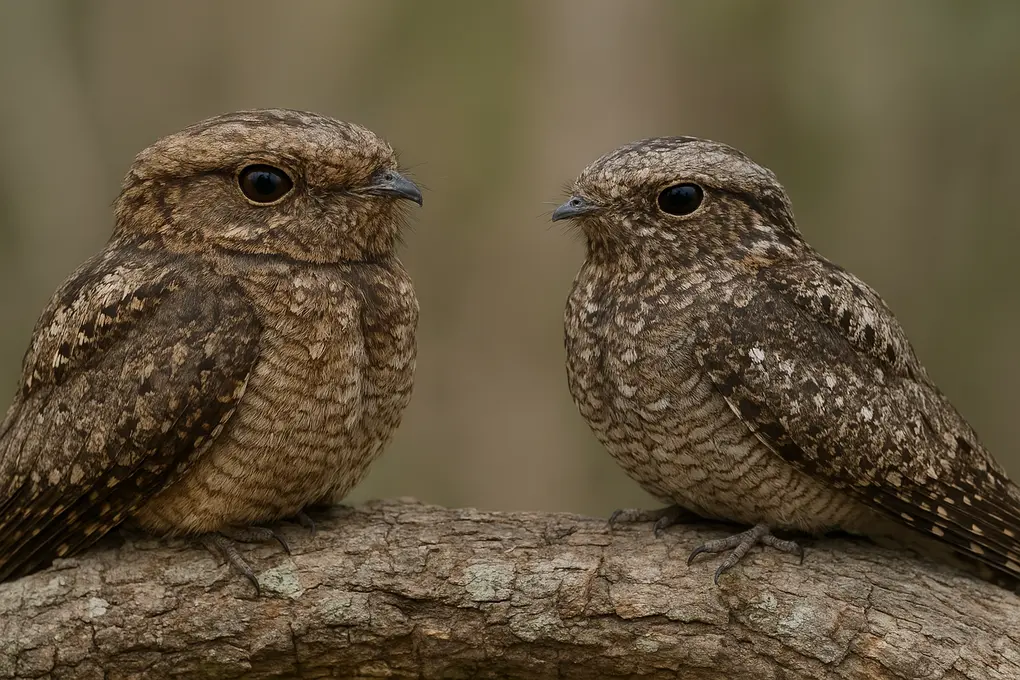
Chuck-will’s-Widow vs. Whip-poor-will:
People often confuse the Chuck-will’s-widow with its cousin, the Eastern Whip-poor-will. The two are closely related nightjars, and their names come from similar-sounding songs. Here’s how to tell them apart:
- Call: The Whip-poor-will’s song is a fast, high-pitched “whip-poor-will” repeated continuously with no break. In contrast, the Chuck-will’s-widow’s song is slower and slower. It has four syllables sung with slight pauses, sounding like “Chuck [pause] will’s [pause] widow”. You can actually hear the chuck at the beginning if you listen carefully ,it’s more subtle if the bird is far away.
- Range: Whip-poor-wills breed further north (from Missouri and North Carolina up into New England and southern Canada), preferring moist deciduous forests. Chuck-will’s-widows are generally southern: they breed from eastern Texas and Florida up to the Mason-Dixon line. Climate shifts have even allowed Chuck-will’s-widows to expand northward, gently pushing some whip-poor-wills back.
- Size & Look: The Chuck-will’s-widow is the largest nightjar in North America (about 20% larger than a whip-poor-will). It has a broader, flatter head and long wings. Its coloring is rich brown with reddish tones, whereas the whip-poor-will tends toward greyer browns and white spots. In dim light these differences are subtle, so often only the distinctive song truly tells them apart.
By understanding the unique call and habits of each bird, you can appreciate the Chuck-will’s-widow on its own terms, not just a “southern cousin” of the whip-poor-will, but a spiritually charged omen all its own.
What To Do When You Hear the Call?
If the Chuck-will’s-widow’s song finds its way to your ears, consider it an opportunity. Here are some calming, practical steps to deepen the experience:
- Pause and Listen: Stop what you’re doing for a moment of quiet. Take deep breaths and really hear the call. Where is it coming from? How does the pattern of the song make you feel?
- Keep a Journal: Write down the date, time, and location when you heard the call, along with any emotions or thoughts at that moment. Journaling can reveal patterns or recurring messages over time. Perhaps you’ll notice that each time you hear the bird, a similar life theme is unfolding.
- Meditate or Pray: Use the sound as a focus for meditation. Visualize the bird’s energy as a guide light. Ask silently: “What message does this bring me tonight?” Sometimes answers come not in words but as a sudden insight or feeling of calm.
- Reflect on Your Life: Think about what’s happening right now in your world. Are you facing a challenge, or yearning for change? The Chuck-will’s-widow’s call could be pointing to something important. For instance, if you’ve been procrastinating on a big decision, hearing it might mean “do not delay.
- Take Small Action: If an idea or goal has been stirring in you, trust that inner nudge and take one step toward it. The bird’s message may be urging you out of stagnation. Even a tiny move forward honors its sign.
- Express Gratitude: Thank the bird (and the universe) for its guidance. A simple mental “thank you” or a moment of appreciation can solidify the positive energy and open you to more signs.
- Seek Guidance: If you remain puzzled, consider asking for a second opinion. You might discuss your experience with a trusted friend, spiritual advisor, or even look up more bird symbolism resources. But above all, trust your own intuition to interpret what feels right.
Overall, treat Chuck-will’s-widow’s visit as a gentle gift. Its call is a quiet cosmic conversation -meaningful if we choose to listen.
Conclusion:
Hearing a Chuck-will’s-widow in the stillness of night can feel magical. This strange nightjar, with its whispered “chuck-will’s-widow” song, is more than just a bird, it is a spiritual guide from the dusk. Its appearance in your life, even as a sound on the wind, carries themes of protection, change, intuition, and hope. It encourages us to reflect on our path, trust our inner voice, and remain open to the mysteries of the universe.
Whether you interpret the call as an omen of love, a sign of divine guardianship, or simply a reminder to break free and pursue your dreams, one thing is certain: the Chuck-will’s-widow invites us to find light in darkness. Its story teaches that even the quietest voice in the night has wisdom to share. Next time you’re out after dusk and its distant whistle floats to you, pause and listen with reverence, you might just hear the gentle wisdom the night has to offer.
